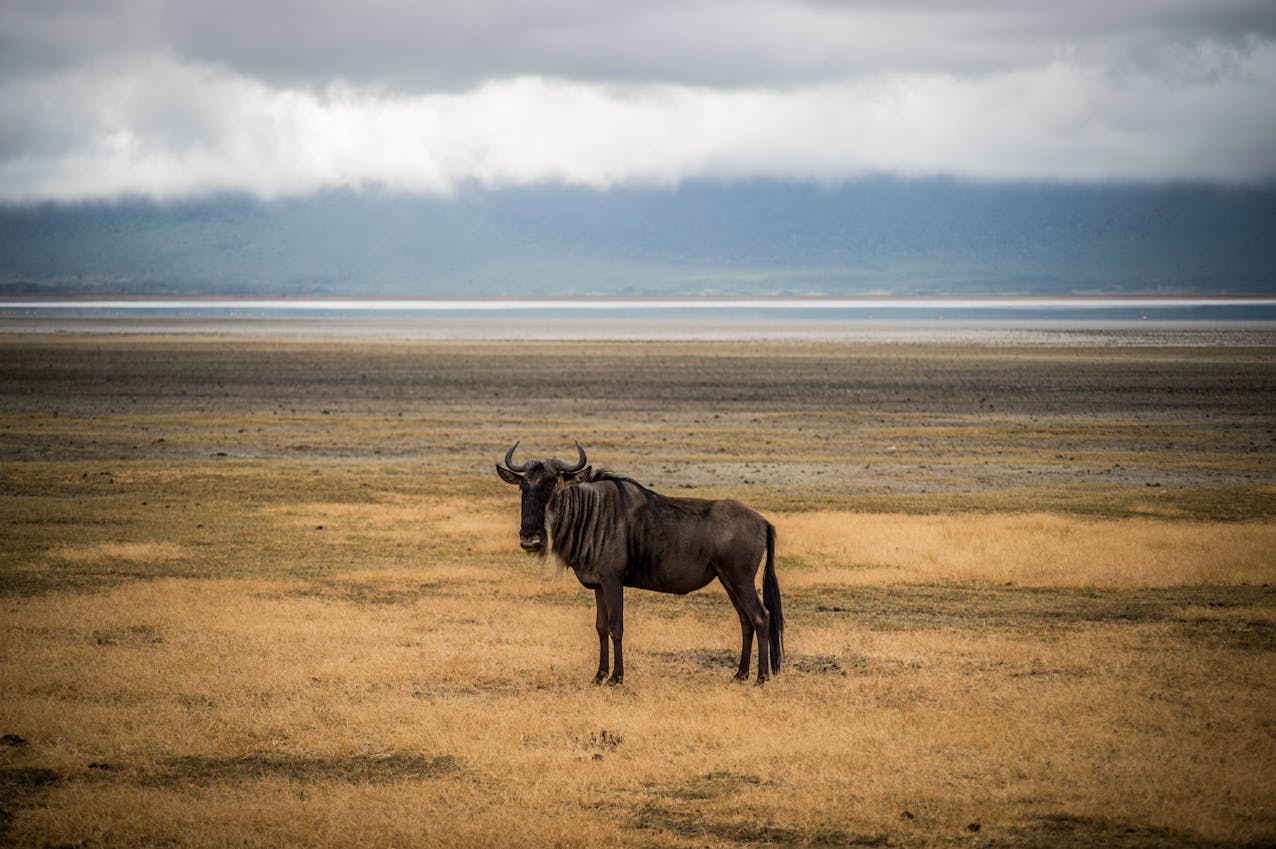Tanzania remains one of the most sought-after safari hunting destinations worldwide. Find out more about what makes this African destination so popular with game hunting enthusiasts the world over and what to consider including for the perfect safari hunting expedition
[DYNAMIC-BLOGTABLEOFCONTENT]
Key Takeaways
- Situated on Africa’s east coast, Tanzania is one of the largest countries in East Africa.
- It is home to various landscapes, cultures and people, resulting in an unforgettable and unique experience when visiting the country.
- Many factors are incorporated into making Tanzania hunting safaris so exceptional, including the diverse range of wildlife, the landscapes, the large hunting grounds, the country’s easy accessibility both within the country and reaching it, as well as the 5* outfitters, guides, and PH’s who go out of their way to ensure a safe and successful safari hunt.
- When hunting in Tanzania, hunters are spoilt for choice with abundant wildlife, extensive hunting areas, professional outfitters and staff, easy accessibility, along with breathtaking landscapes all culminating in an unforgettable hunt
- Tanzania is home to exceptional hunting areas, including the Selous Reserve, Maasailand, Ugalla and Moyowosi Game Reserves, and the Kizigo Central Region.
- The official hunting season for Tanzania is 01 July – 31 December, but it can be extended to 31 March.
- No under 18’s can go hunting in Tanzania, and hunting is only allowed during daylight hours.
- Hunts licenses and permits for 10,16-, and 21-day Tanzania hunting safaris are issued.
- Tanzania remains a relatively easy destination to access, with numerous international airlines with regular flights arriving in Dar es Salaam.
- Be sure to ensure that you are adequately packed in terms of clothing, medical requirements as well as having completed the necessary vaccinations prior to your African hunt.
- Tanzania’s government and conservation organizations play a paramount role in the preservation of the country’s natural resources.
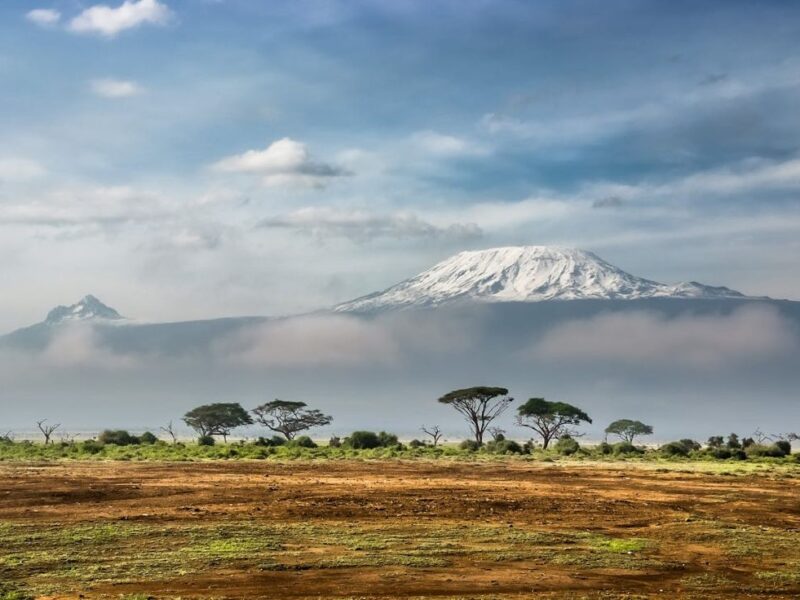
Tanzania at a Glance
Nestled on Africa’s east coast and bordering on the warm Indian Ocean, Tanzania shares its borders with Uganda, Kenya, the Democratic Republic of Congo (DRC), Zambia, Malawi, Rwanda, Burundi, and Mozambique. Tanzania is approximately 365,756 square miles, and one of the largest countries in East Africa.
Tanzania is a melting pot of landscapes, culture and people, and offers hunters some of the most varied safari experiences to enjoy when hunting in Africa. From the towering peaks of Mount Kilimanjaro to the seemingly endless plains of the picturesque Serengeti, this diverse destination is teeming with an amazing array of wildlife.
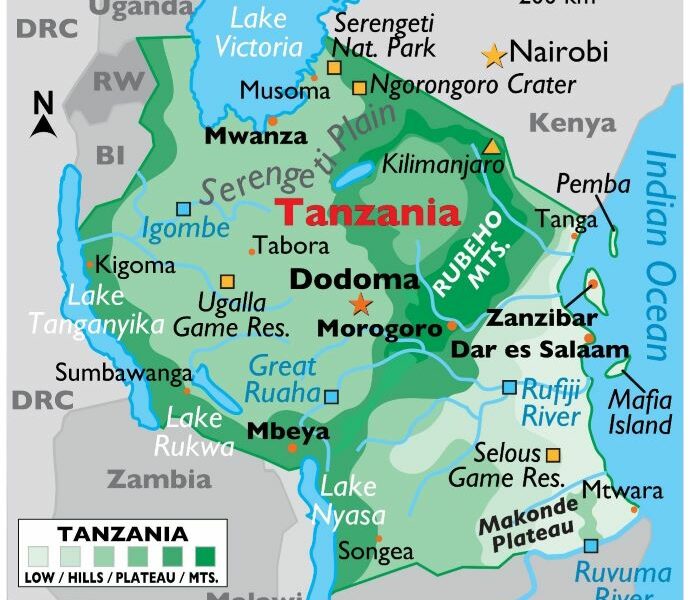
Why Choose a Tanzania Hunting Safari?
When it comes to a Tanzania hunting safari, hunters are spoilt for choice in having the best of the best available to them during their stay. Here are a couple of points as to why they are rated so highly:
Abundant Wildlife
Tanzania is home to abundant wildlife, including iconic dangerous game species, such as the leopard, lion, elephant, and Cape buffalo. Healthy populations of game are available throughout the country’s safari hunting areas, with the excellent conservation efforts being put into practice and supporting the hunting industry.
The area’s diverse biodiversity comes to the fore with exceptional species such as the Sitatunga, fringe-eared oryx, suni, Coke’s hartebeest as well as numerous duikers allowing hunters a challenging Tanzania hunting safari.
Extensive Hunting Areas
A Tanzania hunting safari takes place in large reserves, such as the famous Selous Game Reserve, while the country offers a range of differing hunting habitats, from woodlands and wetlands to savannas and riverine forests, offering hunters the challenge of a safari hunt to test their prowess and allowing them to enjoy a wide range of game hunting in Tanzania.
Professional Outfitters Offering 5 Star Experiences
Tanzania is home to experienced guides and professional hunters, who ensure not only an enjoyable, but a safe safari when hunting in Tanzania. You can expect to be spoilt throughout your Tanzania hunting safari, with outfitters ensuring a top-notch hunting experience, coupled with high end accommodation, services and support to ensure an unforgettable hunting experience.
Seamless Accessibility
Tanzania has an extensive range of domestic flights as well as charter flights, allowing people to easily move within this large country, while two of its main cities, Dar es Salaam and Arusha, are easily accessible for international flights from across the globe.
Even travel by road is seamless, with good accessibility and road networks. Speak to your African outfitter for further information and to see which option best suits your hunting safari requirements.
Exceptional Landscape
While your safari is focused on a specific target or animals species to hunt, it would be difficult not to take note of the breathtaking and varying landscapes on show during your time in the country.
A hunt is not just about hunting the specific game animal but encompasses a range of delights that come together to give the hunter an overall experience on his hunting safari, such as the mesmerizing and contrary landscapes with the Serengeti plains and Mount Kilimanjaro being worlds apart, yet highlights of Tanzania, the accommodation, cuisine, heritage and culture, as well as the country’s people.
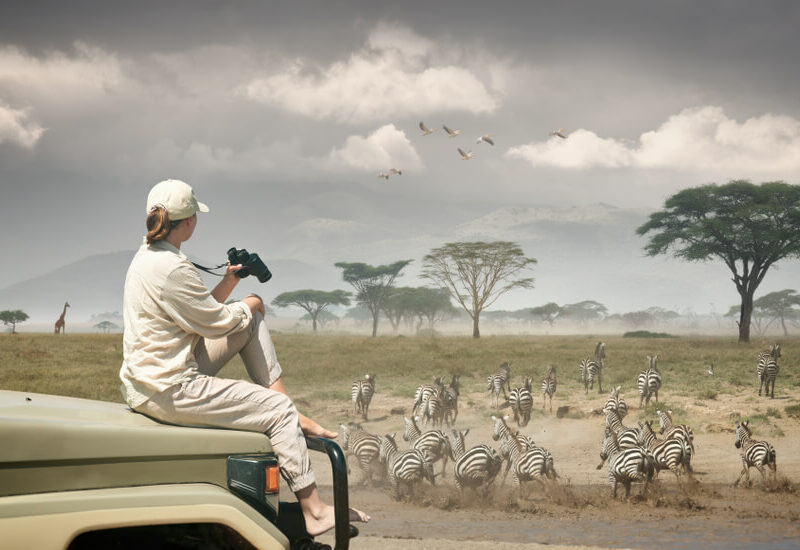
Popular Areas to enjoy a Tanzania Hunting Safari
Hunters remains spoilt for choice in this destination of diverse landscapes and many game species. Some popular hunting areas within Tanzania include:
Maasailand
The region of Maasailand includes Lake Manyara and Losimingor Mountain, as far down as the Tarangire National Park. The Maasailand region is an absolute haven of game hunting options, from the tiny steenbok and Kirk’s Dik-Dik to the majestic Coke’s Hartebeest, both Grant’s and Thompson’s gazelle, the unusual looking gerenuk with its long neck and various dangerous game options, such as the Cape buffalo, the elusive leopard, and lion.
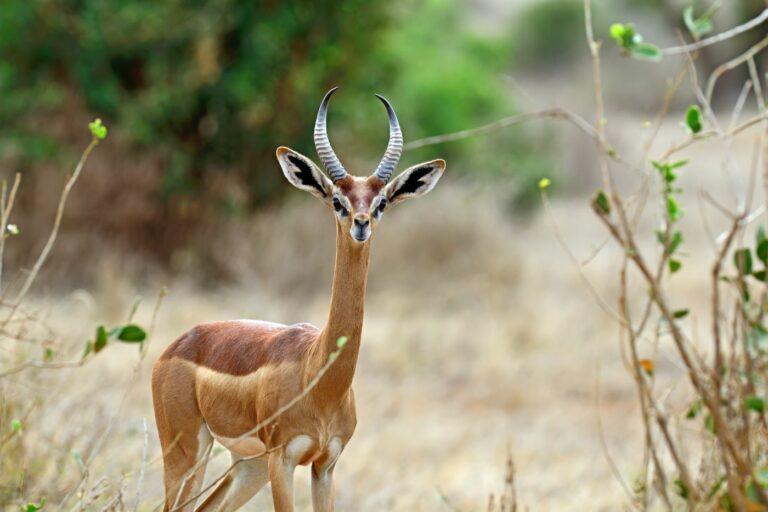
Ugalla and Moyowosi Game Reserves
This region is generally only accessible during the dry season, due to it comprising of mainly rolling savannas, swamps and flood plains. This area is known for producing monster crocs, with other dangerous game such as lion, hippo and leopard, as well as an array of African plains game, including sitatunga, kudu, topi, sable, and roan.
The Selous Game Reserve
If you want an authentic safari hunting experience, then the Selous Game Reserve is the way to go. It is one of the largest protected areas in the country, with three rivers flowing through the region, and minimal human activity. It is known for its dangerous game such as elephants, hippos, crocs, and buffalo, as well as their big cat populations.
Kizigo Central Region
This area is home to numerous species of antelope, including the roan, Greater kudu, and sable, while also providing big game and dangerous game hunting opportunities. If you are interested in securing one of Africa’s biggest dangerous game hunting trophies, then you will be pleased to know that lions are available to hunt in this region.
Spoilt for Choice: Game Species
A safari hunting experience in Tanzania is well worth the wait, with a variety of African plains game, dangerous game, and even specialty game hunting options available, depending on where in the country you plan on visiting.
Popular options for those considering dangerous game hunting in Tanzania include the buffalo, crocodile hippo, elephant, leopard, and lion. There are a variety of African plains game options available such as the eland, gerenuk, greater kudu, bushbuck, hartebeest, impala, reedbuck, road, wildebeest, sable, steenbok, suni, sitatunga, and zebra.
For those interested in specifically targeting some African cats, the serval and wild cat species are available, while other specialty game options include the bushpig, vervet monkey, warthog and hyena.
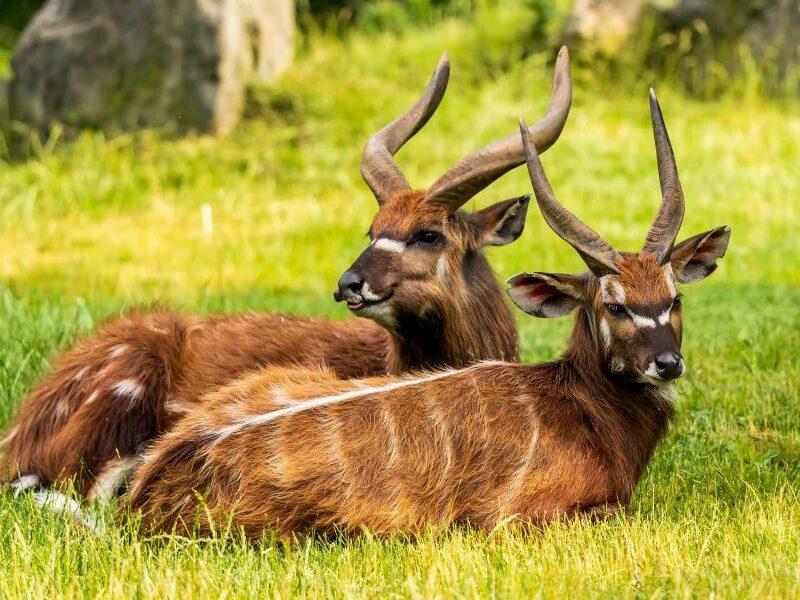
Law, Permits & Regulations for a Tanzania Hunting Safari
- The official hunting season starts on 1 July and ends on 31 December but can be extended until 31 March.
- The minimum hunting age to enjoy a Tanzania hunting safari is 18 years.
- Ensure that you know your African outfitter keeps you in the loop when planning on hunting in Tanzania, as certain laws and regulations need to be complied with, and these can change at a moment’s notice.
- Tanzania hunting safaris are offering in periods of 10, 16, and 21-day hunting permits.
- Some hunts, such as lions and leopards, may require baiting. This is allowable, if the bait itself is also licensed.
- Hunters can only hunt game for which they have a license.
- Hunting from a vehicle is not permitted.
- When targeting the prey, the hunter must be at least 200 yards from the vehicle prior to firing.
- All Tanzania hunts involve a government scout to ensure that there aren’t any laws broken. Once the hunt has been completed the license is signed. If the hunt is cleared, plans will be started for the trophy process.
- Hunting can only be completed during daylight hours.
- Hunting at night is not allowed, even with artificial light.
- The minimum caliber for dangerous game is a .375
Traveling to Tanzania
Arriving in Tanzania is a breeze, with many international airlines flying into the nation’s largest city, Dar es Salaam. These include options such as Qatar Airways, Turkish Airlines, KLM, Kenya Airways, and Ethiopian Airlines, amongst others.
Tanzania is home to two international airports that are used as a gateway into this African destination, namely Julius Nyerere International Airport in Dar es Salaam, as well as Arusha’s Kilimanjaro International Airport. Domestic flights are available to various local destinations within the country, with charter flights another option for hunters wishing to fly directly into a specific hunting concession.
What to Pack for your Safari Hunting Adventure
Packing to go hunting in Tanzania is not only exciting, but also needs to be a thoroughly thought out, as there aren’t any stores around every corner once you arrive in the country and head to the hunting concession.
Below is a brief list that you can amend to suit your individual needs:
Basic Checklist
- Toiletries: Deodorant, toothbrush, toothpaste, soap, facecloth, lotion, razor, etc.
- Should you wear contact lenses, pack a spare set and a pair of glasses, along with a spare bottle of contact lens solution.
- Invest in a good quality pair of sunglasses.
- Good quality SPF sunscreen. Remember to apply it even when the weather is overcast, the strength of the African sun can be quite deceiving.
- Bug spray and insect repellent. Although most hunting safaris take place in the cooler winter months, bugs and mosquitoes can still visit.
First Aid Kit
When hunting in Tanzania, you need to consider that you are not a 5-minute drive away from the closest healthcare professional or drug store. While your African outfitter will be prepared for major medical situations and emergencies, you will need to be prepared to deal with and handle minor ailments from your own medical kit.
For those with specific medical needs:
- For asthma sufferers, be sure to pack a pump, as well as a spare one in case of emergency.
- Your chronic medication, packed in the original packaging, along with a copy of the prescription.
- For those with allergies, don’t forget to pack an epi-pen, extra cortisone tablets, or whatever medication is used to treat your allergies.
- Diabetics, ensure that you have sufficient insulin, as well as some spare.
Consider including basic items as listed below into your own medical kit:
- Band-aids of different sizes
- Scissors and tweezers
- Bandage
- Antiseptic cream
- Disinfectant cream
- Cortisone cream or tablets
- Eye drops
- Medication for vomiting and nausea
- Medication for diarrhea
- Headache tablets
- Pain Medication
- Lip balm
Clothing Items to Pack when hunting in Tanzania
Depending on where in Tanzania you are heading and during what time of year, weather conditions may vary. The best advice is to be prepared, and pack and dress with layered clothing. While mornings and evenings may be cooler, the days themselves may be mild, warm or even hot. Mornings can be icy, especially if you are out in the hunting vehicle, checking for tracks or bait areas. As soon as the sun goes down, so does the temperature, so pack sufficient warm clothing options.
To make things easier, most African outfitters do offer daily laundry services, but it is best to check with yours whether they do or not.
A suggestion would be to consider packing the following items for your Tanzania hunting safari:
- Beanie – Don’t underestimate the power of a warm head, or how much warmth you can loose through your head.
- Gloves – Gloves are always a good idea to keep those fingers and hands warm.
- Hat or Cap – As the sun appears, swop that beanie for a hat or cap. A suggestion would be a wide-rimmed hat that also protects the neck. Hand-in-hand with hats, of course, goes sunblock.
- Bandana – Great for keeping sweat out of the face.
- Thick Jacket – Keeping warm remains a challenge if you are out checking traps or bait early in the morning, keeping warm is a challenge!
- Light rain jacket or poncho – Always a good idea, and very easy and light to include.
- Shorts – In Tanzania, wear longer shorts or long pants to respect local customs and traditions. Long pants are a good option to not only protect your legs against thorns and sharp vegetation, but also against critters in the bush like insects, ticks, fleas, bugs and so forth.
- Long-sleeved shirts – Wearing long-sleeved shirts not only protects hunters from the harsh sun, but also from sharp thorns or bushes, as well as insect bites, ticks, and fleas.
- 2 x Pairs Waterproof Boots – Well-worn boots are a must, along with thick socks. Remember to change socks regularly, as foot odor attracts bugs! If you have your sights set on the swamp areas, pack extra socks and change your foot gear regularly.
- Casual Clothing for around camp – Pack 1-2 sets of casual clothing to wear around camp, such as long shorts, T-shirts, tracksuits, or jeans.
Other items to consider including in your packing list are binoculars, Leatherman or multi-tool, flashlight or headlight, along with spare batteries as well as charges for any devices that may require them, along with the necessary adapters.
Tanzania and Conservation Efforts
While some may scoff at the notion of ethical and responsible hunting contributing to conservation this is in fact quite true. By using, maintaining and managing hunting quotas and enforcing hunting regulations and permits, the government and conservation bodies ensure and oversee wildlife conservation.
This diverse destination is dedicated to preserving its natural heritage, and has established many national parks, conservation areas and game reserves to protect its array of wildlife and their ecosystems. Emphasis is placed on sustainable tourism, anti-poaching initiatives, and community involvement, ensuring that Tanzania’s natural treasures are preserved for future generations, during the conservation efforts.
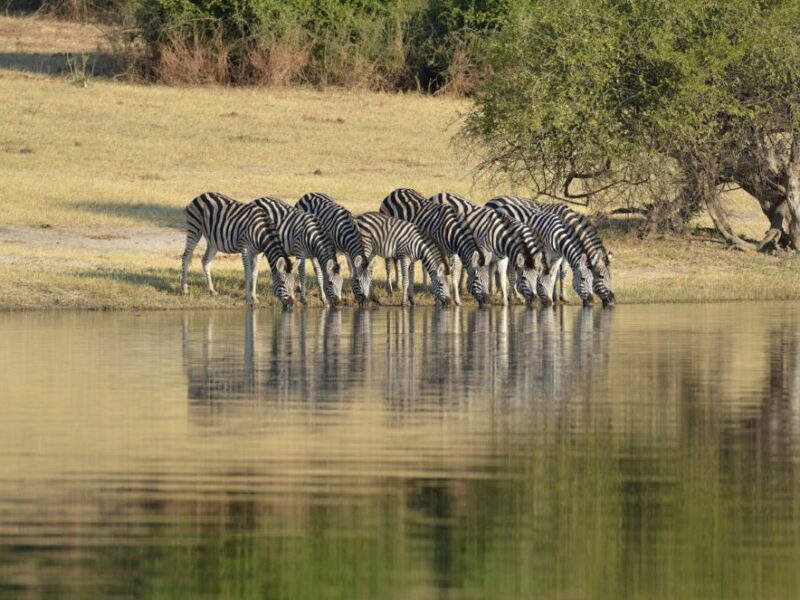
Frequently Asked Questions
Why are Tanzania hunting safaris so expensive?
Tanzania is a large country, with hunting lodges and safaris often taking place far from towns and villages, which leads to high operations costs, which in turn then results in the safari hunting experiences being more expensive than other game hunting destinations.
Can I wear shorts when hunting in Tanzania?
Yes, you can wear shorts but keep them to longer length styles, or long pants. Respect for the local cultures, traditions and customs remains paramount.
Where in Tanzania can I enjoy a hunting safari?
Tanzania is home to exceptional hunting areas, including the Selous Reserve, Maasailand, Ugalla and Moyowosi Game Reserves, and the Kizigo Central Region.
Do I require vaccines to visit Tanzania?
The CDC and WHO recommend the following vaccinations for Tanzania:
- Typhoid
- Hepatitis A
- Hepatitis B
- Polio
- Yellow fever
- Chikungunya
- Rabies
- Influenza
- COVID-19
- Pneumonia
- Meningitis
- Chickenpox
- Shingles
- Tdap (tetanus, diphtheria and pertussis)
- Measles, mumps and rubella (MMR)
Can I hunt in the Serengeti?
No, it is illegal to hunt wildlife in the Serengeti region, but there are many other concessions where hunting in Tanzania is legal.
Is hunting allowed in Tanzania?
Yes, hunting is legal in Tanzania, but there are strict regulations that must be followed and permits that must be obtained.
What is the minimum caliber requirement for hunting leopards in Tanzania?
Leopards are dangerous game and therefore targeting this species on a Tanzania hunting safari requires the minimum of a .375 caliber.
Conclusion
Tanzania is a diverse and thrilling African destination to consider on a bucket list hunting safari. The combination of exceptional wildlife concessions, together with plentiful game and quality African outfitters ensure that any hunter visiting is sure to experience an unforgettable African hunt.
Author: B. Hershensohnn
